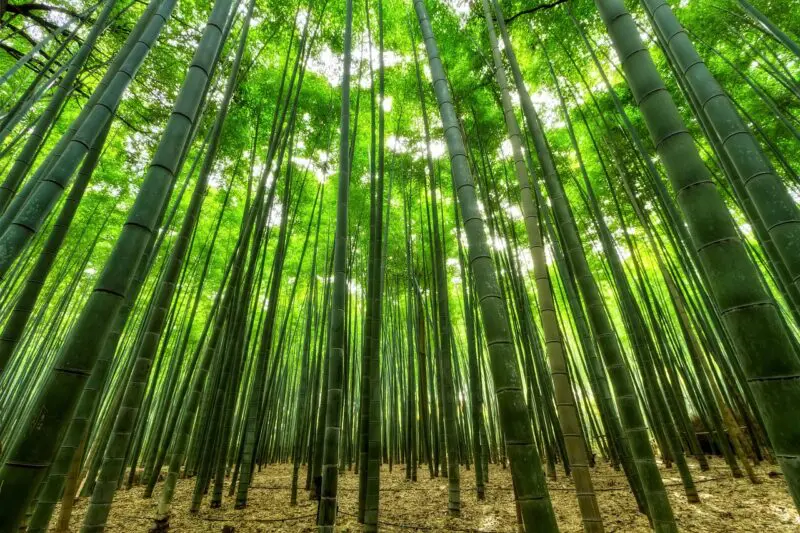Bamboo, a remarkable plant known for its strength, flexibility, and rapid growth, holds a deep spiritual and symbolic meaning in various cultures.
Across centuries, bamboo has been revered and incorporated into spiritual practices, offering valuable teachings and insights.
In many traditions, bamboo embodies resilience and adaptability. Just like its stalks that can withstand powerful storms without breaking, bamboo teaches us to face challenges with strength and flexibility.
It serves as a reminder to persevere, embrace change, and find growth in the face of adversity.
Bamboo’s symbolic significance extends beyond its ability to weather storms. Its rapid growth, which can reach several feet in a single day, represents prosperity and progress. Like the bamboo’s continuous upward growth, we too can aspire to grow in all aspects of our lives.

Moreover, the symbolism of bamboo encompasses spiritual enlightenment. The plant’s grace and simplicity can inspire us to find ease and tranquility within ourselves. Bamboo reminds us to seek balance, harmony, and clarity, aligning our spiritual and physical selves.
By connecting with the spiritual teachings of bamboo, we can foster personal growth, embrace change, and find strength in our journey towards enlightenment.
Key Takeaways
- Bamboo holds deep spiritual and symbolic significance across cultures.
- Its strength and flexibility teach us resilience and adaptability.
- Rapid growth symbolizes prosperity, progress, and personal growth.
- Bamboo inspires balance, harmony, and spiritual enlightenment.
- Embracing the spiritual teachings of bamboo can foster personal growth and strength.
Bamboo Plant Symbolism in Asian Cultures
Bamboo plants hold tremendous symbolic significance within Asian cultures. From China and Japan to Southeast Asia and Hawaii, bamboo represents various virtues and serves as a powerful spiritual symbol.
Bamboo Symbolism in China
In Chinese culture, bamboo is highly valued for its symbolism of virtue and inner strength. It reflects the soul and emotions of the Chinese people, embodying qualities such as resilience, flexibility, and integrity.
Bamboo Symbolism in Japan
In Japan, bamboo is regarded as a symbol of prosperity, simplicity, and protection. The tall and sturdy bamboo stalks represent strength, while the simplicity of its design reflects the value of minimalism and elegance in Japanese aesthetics.
Bamboo Symbolism in Southeast Asia
Throughout Southeast Asian countries like Vietnam, Malaysia, and the Philippines, bamboo holds multiple symbolic meanings. It is often associated with strength, flexibility, and endurance, representing the ability to adapt and overcome challenges. Bamboo is also seen as a symbol of new beginnings and prosperity in these cultures.

Bamboo Symbolism in Hawaiian and Polynesian Cultures
In Hawaiian culture, bamboo is revered for its symbolism of resilience and adaptability. Its ability to bend without breaking in strong winds and storms is seen as a valuable life lesson. Similarly, bamboo holds significance in Polynesian cultures, symbolizing strength, growth, and a deep connection with nature.
Symbolism of the Bamboo Plant
Bamboo is a plant that carries significant symbolic meanings. It serves as a powerful representation of strength and flexibility, imparting valuable lessons on how to navigate through life’s challenges with resilience and adaptability. In the face of adversity, bamboo remains upright and unyielding, reminding us to stay strong and firm.
The rapid growth of bamboo also holds profound symbolism. Just as the plant quickly shoots up towards the sky, it serves as a symbol of personal growth and wisdom. Bamboo encourages us to constantly strive for improvement, embracing change and acquiring knowledge along the way.
In many cultures, bamboo is regarded as a harbinger of luck and prosperity. Its presence is believed to attract blessings and positive energy into one’s life. By embracing the symbolism of bamboo, we can invite good fortune and abundance into our journey.
Bamboo’s durability and resistance to decay make it a potent symbol of health and longevity. Just as this resilient plant endures the test of time, it inspires us to prioritize our well-being and seek a harmonious balance between mind, body, and spirit.
Furthermore, bamboo symbolizes harmony and balance in both the natural world and our personal lives. Its tall and straight stems, alongside its lush green foliage, create an aesthetically pleasing sight that evokes a sense of tranquility. Bamboo reminds us to find equilibrium within ourselves and foster harmonious relationships with others.
Embracing the Spiritual Essence of Bamboo
Bamboo is not just an ordinary plant; it holds a profound spiritual essence that resonates with various cultures and belief systems.
Beyond its practical applications in construction and crafts, bamboo symbolizes a deep connection with nature and spirituality, inviting us to embrace its wisdom and teachings.

In Zen Buddhism, bamboo plays a significant role as a symbol of enlightenment and resilience. Like the bamboo, we can find strength in our ability to bend without breaking, adapting to life’s challenges while remaining rooted in our core values.
The simplicity and flexibility of bamboo serve as powerful reminders to cultivate inner harmony and embrace the present moment.
In feng shui practices, bamboo is regarded as a harbinger of positive energy and good luck. Its vibrant growth and ability to flourish in diverse environments make it a powerful symbol of growth and prosperity.
Placing bamboo in our homes or workspaces is believed to attract auspicious energies, fostering a sense of balance and abundance in our surroundings.
By embracing the spiritual essence of bamboo, we invite a deeper connection with nature, ourselves, and the world around us. Its symbolism reminds us to stay flexible, embrace growth, and seek harmony in all aspects of our lives.
Whether we find solace in Zen Buddhism or seek to enhance the positive energy in our spaces through feng shui, bamboo serves as a gentle guide on our spiritual journey.
FAQ
What is the spiritual meaning of bamboo?
The spiritual meaning of bamboo is rooted in its unique characteristics of strength, flexibility, and growth. It symbolizes resilience, adaptability, and perseverance, reminding us to embrace growth and stay flexible in various aspects of our lives.
What is the symbolism of bamboo in different Asian cultures?
In Chinese culture, bamboo is a symbol of virtue and reflects people’s souls and emotions. In Japanese culture, it symbolizes prosperity, simplicity, and protection. In Southeast Asian countries like Vietnam, Malaysia, and the Philippines, bamboo often symbolizes strength, flexibility, new beginnings, and endurance. In Hawaiian culture, bamboo represents resilience and adaptability.
What are the symbolic meanings of bamboo?
Bamboo represents strength and flexibility, teaching us to be resilient and adaptive in the face of challenges. Its rapid growth symbolizes personal growth and wisdom. Bamboo is also associated with luck, prosperity, health, and longevity. Additionally, it symbolizes harmony and balance, reminding us to find balance within ourselves and with the world around us.
How does bamboo connect with spirituality?
Bamboo holds a deep spiritual meaning that resonates with different cultures and belief systems. It symbolizes enlightenment and resilience in Zen Buddhism and attracts positive energy and good luck in feng shui practices. Embracing the spiritual essence of bamboo can bring balance and positive energy into our lives.




